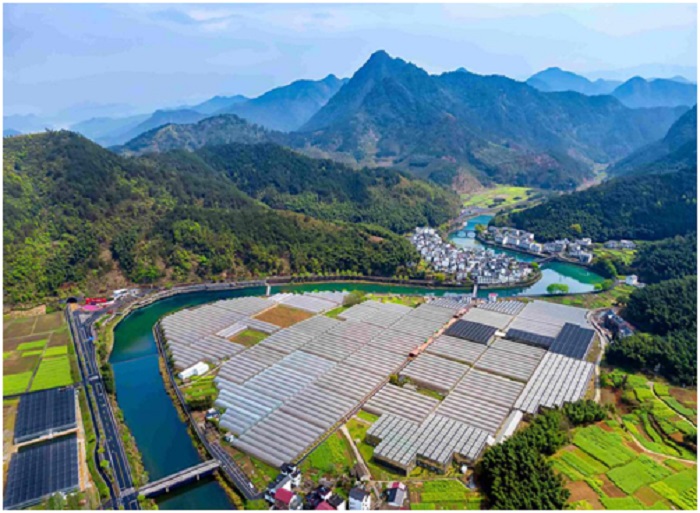



While enjoying bright sunshine and beautiful spring scenery, a tourist named Zhang Ao was attracted to the tranquil and idyllic surroundings and impressed by the convenient services she received in Luniao township, Yuhang district, Hangzhou city, capital of east China’s Zhejiang province.
“I swiped my ID card and finished checking in within half a minute, ” said Zhang, who was surprised by the convenient services at the B&B hotel where she booked a room online.
With a smartphone, people can easily receive one-stop services including enjoying scenery via virtual reality (VR) devices, navigation service, and booking hotel rooms and tickets online, according to Guo Jian, mayor of Luniao township.
By making full use of the platform of Yuhang district in the City Brain system of Hangzhou, a project launched to help the city improve urban management by leveraging cutting-edge technologies, the township has facilitated the development of local tourism industry through in-depth integration of digital technologies and smart facilities into the sector, Guo expalined.
In fact, besides Luniao township, many other areas of Zhejiang province have also witnessed a boom in rural tourism by integrating the beautiful landscape and results of digital transformation.
The great changes in rural areas of Zhejiang province started in 2003, when the province launched its Green Rural Revival Program to comprehensively improve the living environment of villages and the quality of rural residents’ lives.
After continuous efforts over the past 18 years, numerous villages in Zhejiang province have taken on a brand new look. With smooth roads, clean environment, complete facilities, and high-quality services, these beautiful villages are attracting tourists from all over the country.
Last year, the per capita disposable income in Zhejiang reached 50,000 yuan ($7,640) mark for the first time, and the income of its urban residents and rural residents topped that in other provinces and autonomous regions of the country for the 20th and 36th consecutive years respectively.
Meanwhile, the ratio of the per capita disposable income of urban residents in Zhejiang to that of rural residents in the city dropped to 1.96 :1.
The increasing income of residents and narrowing urban-rural income gap have become a highlight in Zhejiang’s development.
According to China’s recently published Outline of the 14th Five-Year Plan (2021-2025) for National Economic and Social Development and the Long-Range Objectives Through the Year 2035, the country will support Zhejiang province in building a demonstration zone for common prosperity through high-quality development.
Endeavoring to unswervingly push forward with high-quality development, improve labour productivity, and continuously increase the total amount of social wealth, the provincial government of Zhejiang province not only introduced a regulation to promote the development of provate enterprises in Zhejiang, but implemented a slew of innovative and favorable policies and projects to facilitate the development of small and micro firms, nurture leading enterprises and help companies sharpen competitive edges.
While making the pie of development bigger, Zhejiang has paid more attention to dividing the pie properly. The province has establihsed and improved a mechanism under which people who get rich first help those who lag behind to achieve prosperity, and optimized the structure of income distribution, constantly narrowing the gaps between urban and rural areas, people’s incomes, and different areas.
At the same time, Zhejiang has also sped up efforts to boost the development of less developed areas, in a bid to promote coordinated development of all areas.
Recently, Shangyu district in Zhejiang’s Shaoxing city has been busy broadening sales channels for local honey produced by villagers in Jingning She autonomous county of Lishui city in the province. Shangyu district has paired up with the county to help it shake off poverty under the country’s “pairing assistance” program.
The personnel sent by Shangyu district to Jingning She autonomous county have helped local farmers make marketing planning, establish sales platform, receive orders, package products, and arrange for shipment.
“Shangyu district has not only establihsed online sales platforms for us, but helped bring our local specialties to poverty-relief sections of large shopping malls and supermarkets as well as wholesale markets of agricultural products in the district,” said Ye Juanrong, a villager in Jiadi township of Jingning She autonomous county.
Thanks to the help of Shangyu district, Ye, who is a sales agent of the local products of Jiadi township, has sold agricultural and sideline products worth of nearly 500,000 yuan since the beginning of this year.
As it advances high-quality development and deepens the construction of the demonstration zone for common prosperity, Zhejiang province is preparing to create an important window into the strengths of socialism with Chinese characteristics in the new era.


The Executive and members of the.


The Acting Director, FCT Directorate of.


President Bola Ahmed Tinubu has been.



Barely a month after resignation of.


An Abuja based Legal Practitioner, Osuagwu.



Convener of Equitable Remedy, Mrs. Magaret.


Contractors handling the contract for city.


Nigerian government may have concluded plans.


The Diplomatic Correspondents Association of Nigeria.


A rights group, “Follow Me Talk.
Leave a Comment